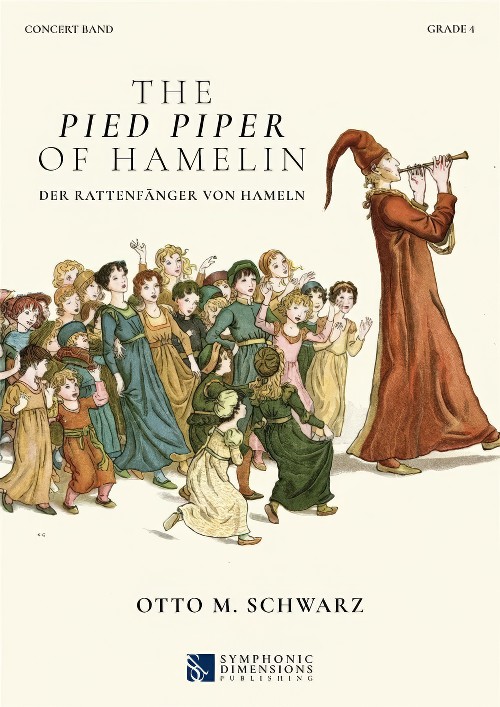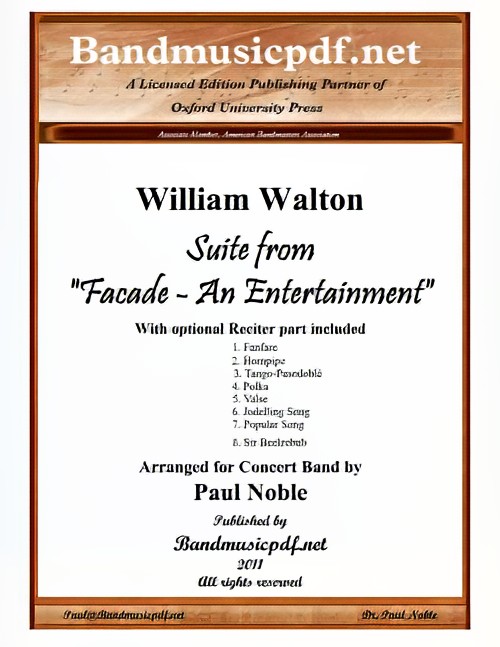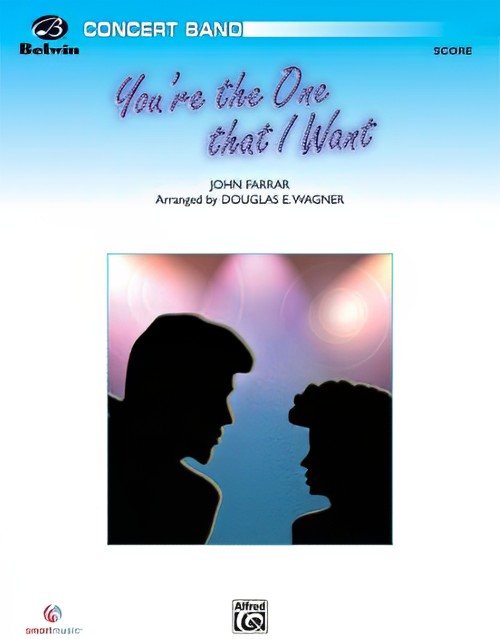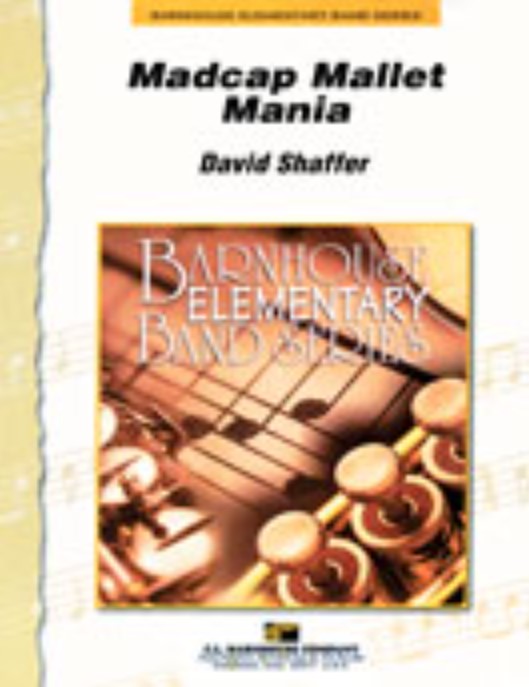Results
-
 £76.99
£76.99The Eighties
Journey through the amazing 80's with this exciting musical synopsis. The hits, the fads, the shows and events are here to entertain all ages! Includes: Chariots Of Fire, Billie Jean, Bad, Don't Worry, Be Happy, One Moment In Time, Faith, Material Girl, Memory, Flashdance, Phantom Of The Opera, Uptown Girl, E.T.,Physical, Olympic Fanfare, That's What Friends Are For, We Are The World, and Somewhere Out There. t
Estimated dispatch 7-14 working days
-
 £163.99
£163.99The Pied Piper of Hamelin (Concert Band - Score and Parts) - Schwarz, Otto M.
Stories, sagas and legends--who among us don't know them? Always delivered with a tinge of brutality, these cautionary tales are a legacy of moral education from times past: inquisitive children alone in the forest are generally eaten by a witch; the 'Soup-Kasper' of Hoffmann's Struwwelpeter dies from starvation rather than eating his soup; anyone letting in strangers usually gets devoured; anyone who plays with matches gets burned; and thumb-suckers get their thumbs cut off. The list of unfortunate demises is almost endless.In the tale of The Pied Piper of Hamelin, parents lose their children through greed, ridicule, scorn and a failure to appreciate art. There is still a street in the town of Hamelin in which neither drumming nor playing has not been allowed since 130 children disappeared into a mountain, never to be seen again. This composition by Otto M. Schwarz opens with exactly this scene, taking us back to the year 1284. As in many towns at the time, Hamelin in Germany suffered with hygiene problems--rats and mice began to multiply rapidly, and the town was overrun with the plague. There appeared a man dressed in colourful clothes who promised the locals to free them from this burden. They agreed and settled on a fee. Then the man pulled out a pipe and began to play. When the rats and mice heard this, they followed him. He led the animals into the Weser River, where they all drowned. Back in town, the people refused to pay him. They didn't recognise this man's skills and knowledge and were only prepared to pay for simple labour. A pact with the devil was made, which led to the Pied Piper leaving the town in a furious rage. One Sunday, when many people were at church, he returned, took out his flute and began to play. The town's children were so enchanted by his playing that they followed him. He led them out of the town and disappeared with them forever into a mountain forever. Of all the children, only two survived--however one was mute, and one was blind. In the street from which the children left Hamelin, music may no longer be played in memory of this event. The work may be performed in two different versions: 1. Purely instrumental (without narrator)--the GPs (pauses) must be kept short 2. With narrator--he speaks in the GPs but not during the music.Duration: 14.15
Estimated dispatch 7-14 working days
-
 £375.00
£375.00Facade - An Entertainment, Suite from (Concert Band with Optional Narrator - Score and Parts) - Walton, William - Noble, Paul
This Suite from Facade - An Entertainment, composed by William Walton, with poems by Dame Edith Sitwell, presents for the first time a grouping of movements selected and arranged by Paul Noble for Concert Band and optional Reciter. The original composition was written between 1921 and 1928, containing forty-three numbers. They had their origin in a new style of poetry that Edith Sitwell evolved in the early 1920s, poems that her brother Osbert later described as 'experiments in obtaining through the medium of words the rhythm and dance measures such as waltzes, polkas, foxtrots... Some of the resulting poems were sad and serious... Others were mocking and gay... All possessed a quite extraordinary and haunting fascination.' Possibly influenced by the dance references in some of the numbers, Osbert declared that the poems might be further enhanced if spoken to a musical accompaniment. The obvious choice of composer was the young man who lived and worked in an attic room of the Sitwell brothers' house in Carlyle Square W[illiam] T[urner] Walton, as he then styled himself. The now historic first performance of the Facade Entertainment took place in an L-shaped first-floor drawing-room on January 24, 1922. Accompaniments to sixteen poems and two short musical numbers were performed by an ensemble of five players. The performers were obscured from the audience by a decorated front curtain, through which a megaphone protruded for Edith to declaim her poems. This was, as she put it, 'to deprive the work of any personal quality'. The first public performance of Facade was given at the Aeolian Hall on June 12, 1923. By now, fourteen poems had been set, others revised or rejected, and an alto saxophone added to the ensemble. The occasion gave rise to widespread publicity, both pro and contra, and the name of the twenty-one year old W. T. Walton was truly launched. In the ensuing years the Facade has gone through revisions and additions, with full orchestral arrangements of selected movements being made without the Reciter. Former Band Director Robert O'Brien arranged some movements for band, again without Reciter, which are now out of print. So this 'history making' addition is the first opportunity for Concert Bands to present some movements of Facade with poems as originally intended. The luxury of electronic amplification allows the full ensemble to perform without necessarily overshadowing the Reciter. And the arrangements are written with considerable doubling so that the ensemble may play in full, or reduced in size as may be desired for proper balance. And, though not encouraged, the arrangements are written so that the band can perform the music without the Reciter. Program notes are adapted in part from those written by David Lloyd-Jones and published by Oxford University Press in the Study Score of William Walton's Facade Entertainments.
Estimated dispatch 7-14 working days
-
 £58.50
£58.50You're the One That I Want (Concert Band - Score and Parts) - Farrar, John - Wagner, Douglas E.
Even if you didn't grow up in the heyday of Elvis and poodle skirts, you can't resist being drawn into the wild world of Rydell High's Class of 1959. Re-live the classic tale with this fast-paced, essentially 50s number. You're the One That I Want is also the title of NBC's mammoth casting call for a Broadway production of Grease in the Summer of 2007. Duration: 2.15
Estimated dispatch 7-14 working days
-
 £50.00
£50.00Madcap Mallet Mania (Mallet Percussion Feature with Concert Band - Score and Parts) - Shaffer, David
Feature your aspiring mallet percussion players with this cute rock tune. Can be performed as a solo, a duet or a trio and you can even double those parts to make sure everyone gets involved in the action and any mallets instruments will work. Mallet parts aren't very hard but sound very impressive. Will pay big dividends to your band program. Can't be beat!Duration: 2.00
Estimated dispatch 7-14 working days
-
£88.00
Venkovanka - Bedrich Smetana - John Glenesk Mortimer
Country Girl / Mdchen aus dem Lande T. 123
Estimated dispatch 10-14 working days
-
 £70.99
£70.99Hey Baby Feat. Deb's Daughter - Dimitri Thivaios, Michael Thivaios, T.W. Pentz, P.A. Hanna, F.M. Richard - Frank Bernaerts
Estimated dispatch 10-14 working days
-
 £57.00
£57.00Jazz Kings
This jazz styling of the popular holiday carol "We Three Kings" offers a tribute to artists who are considered jazz royalty: Duke Ellington and Count Basie. Shades of "It Don't Mean a Thing" and "One O'Clock Jump" emerge around the carol tune as it moves between sections of 4/4 and 3/4 time. Introduce students to playing in jazz style with this fun take on a holiday classic!
Estimated dispatch 12-14 working days
-
 £57.00
£57.00Hope Remains Within - Zachary Cairns
Pandora opens a jar (in seemingly more accurate translations) and releases numerous evils, diseases and other pains into the world, but one thing remains within the jar: hope. Why does hope remain within? Why doesn't it come out and help humanity? Why was it included with all those evils in the first place? Zachary Cairns wrote this piece to engage these unanswered questions. This dramatic concert selection encourages students and listeners to consider their own ideas of what hope is.
Estimated dispatch 12-14 working days
-
 £118.99
£118.99Cats - Andrew Lloyd Webber
The Musical CATS, with music by Andrew Lloyd Webber is based on the 1939 poetry collection Old Possum's Book of Practical Cats by T. S. Eliot. It became Lloyd Webber's third great success, after the musicals Jesus Christ Superstar and Evita. He began setting Eliot's poems to music in 1977, and the compositions were first presented as a song cycle in 1980. Producer Cameron Mackintosh then recruited director Trevor Nunn and choreographer Gillian Lynne to turn the songs into a complete musical. CATS became one of the longest-running shows in West End and Broadway history. It received its world premiere at the New London Theatre in 1981, where it played for 21 record-breaking years and almost 9,000 performances. The following year, CATS opened at New York's Winter Garden Theatre, its home for the next 18 years, garnering seven 1983 Tony Awards, including Best Musical. The show returned to Broadway in 2016, where it had a successful pre-tour run at the Neil Simon Theatre. CATS has been presented in over 30 countries, translated into 16 languages, and seen by more than 73 million people worldwide. Lloyd Webber's magnificent musical score includes the poignant hit song Memory, which has been recorded by over 150 artists, from Barbra Streisand to Liberace to Barry Manilow. It took 7,486 chandelier crashes for Lloyd Webber's The Phantom of the Opera to take over from CATS as the longest-running show in Broadway history in January 2006.
Estimated dispatch 7-14 working days
